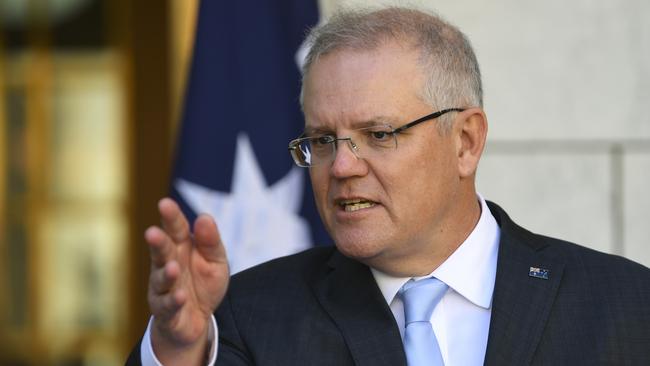
The Prime Minister is also resetting expectations about economic recovery after Australia’s relative success in controlling the virus. He has dropped his use of a “snapback” and the government is moving from an image of a sharp V economic recovery to more of a lazy U. There is also a clear message that the extraordinary government support to businesses and individuals, particularly JobKeeper, to keep the economy alive is “temporary” and virtually impossible to sustain or extend beyond the six-month schedule.
“The thing that matters is getting Australians back into work. The thing that matters is getting Australian businesses back open, because when that happens, there will be no need for those levels of income support,” Morrison declared on Monday.
‘‘Success for our economy is when we’re able to get ourselves out of the situation which requires such enormous taxpayer support. And it’s not just today’s taxpayers, it’s tomorrow’s taxpayers as well.”
While he said JobKeeper was working and would do its job as long as needed, “the test, ultimately, is ensuring we get people back into jobs. If people are in jobs, they don’t need income support and that’s my task”.
Morrison said the object of JobKeeper and other support was to ensure the economy “would hit the ground moving, not running, but moving”, and build economic growth and create jobs as quickly as possible.
As far as reducing the $130bn JobKeeper program, Morrison said Australia was only “six weeks into a six-month program” and it was premature to either assume the virus was beaten or deny the “uncertainties about the global economy, let alone our own economy, are still very much there”.
At the beginning of March, Morrison started to talk about snapping back the economy after the virus was quashed but since Anthony Albanese has politically weaponised “snapback” and linked it to a fast recovery, the PM has dropped the term.
On Monday, amid optimistic forecasts of 850,000 moving back into jobs, Morrison warned against premature speculation and said “we need to adjust based on advice about the strength of the economy and how many people are getting back into jobs”.
With the Opposition Leader framing his political criticism of Morrison and the holding of the government to account based on the idea of “snapback” and quick recovery, the Coalition is being jammed between the success of the JobKeeper program in keeping people off the dole, its estimated $20bn-a-month cost and an expectation it will continue beyond the original six months.
So as the government succeeds in the viral battle, the economic fight and handling expectations are becoming more complicated on the road out as Morrison stresses dealing with the problems Australians are facing “right here and right now”.
For his part, Albanese has set out his own plan for Labor to navigate the “road out” from the pandemic, which stays faithful to traditional ALP values, reasserts the relevance of the opposition and preserves his in-principle support for the biggest economic outlays in Australia’s history.
In many ways, it is a classic opposition response to crisis, which gives the government of the day natural superiority, certain political immunity, because it binds the opposition to support policies, and, at the same time, denies the opposition political relevance.
If an opposition is forced to support a policy, criticism of that policy, apart from shortcomings already noted, is impossible unless it concentrates on the effectiveness of the implementation.
Labor, having changed its policy on offshore detention and processing of asylum-seekers, could not criticise the policy itself but instead concentrated on the implementation of the policy through the number of detainees, the length of time in detention and number of children in detention.
Albanese is harking back to the pre-coronavirus political and economic conditions by declaring the crisis “has exposed a complacency about the underlying health of our economy and society that has deepened over the last seven years of Liberal government’’. As parliament resumes on Tuesday, he said: “Labor has not and will not be obstructionist.
‘‘We will scrutinise and improve the government’s plans.
“We will continue to hold the government to account on behalf of the people we represent.
“I firmly believe that Labor is best placed to learn the lessons of the recent past, and to build a better and fairer future,” he said in his latest “vision” statement as he positioned Labor as a critic of the government without being obstructionist to policies that are clearly popular and supported by Labor.
Morrison and Albanese are both trying to reset politics and benchmarks on the road out.




Scott Morrison is setting his own test for success over the coronavirus crisis and it’s not just a low number of viral deaths and infections but the lowest number of unemployed people as possible after the worst of the pandemic passes.